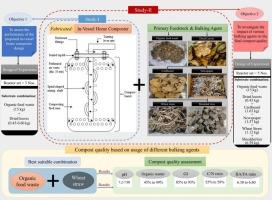餐厨垃圾容器式家用堆肥机的研制与性能评价
Q1 Environmental Science
引用次数: 0
摘要
在全球范围内,来自居民家庭的有机食物垃圾(OFW)构成了城市固体废物的主要部分。分散式堆肥已经成为一种很有前途的清洁技术解决方案。本研究旨在评估为城市家庭量身定制的紧凑模块化设计的容器式家庭堆肥机的批量规模可行性,以解决与空间、气味和操作挑战相关的问题。研究方法分为两个阶段:(a)根据关键审查和实地调查开发船内堆肥器,(b)进行批量研究(45个周期),以评估拟议的船内堆肥器在不同操作条件下的性能评估。结果表明,该堆肥品质的总有机质(55%)、pH(8)、碳氮比(12)和发芽指数(GI)(85%)具有丰富的养分和土壤调理性能。此外,本研究还重点研究了不同的膨化剂(干叶、纸板、麦秸、报纸和碎轮胎)对堆肥质量的影响。研究了曝气和翻转机制对堆肥循环的影响。在所有膨化剂中,小麦秸秆对堆肥质量的提高效果最好。其pH值为7.72,总有机质为47%,GI为92.8%,腐植酸/黄腐酸(HA/FA)比为6.57。与其他膨化剂相比,麦秸堆肥的GI和HA/FA比提高了15 - 20%。就未来的适用性而言,容器式堆肥器产生的营养丰富的堆肥可以有效地作为有机肥料重复使用,用于社区一级的园艺、园林绿化和土壤修复活动。本文章由计算机程序翻译,如有差异,请以英文原文为准。

Development and performance assessment of in-vessel home composters for food waste valorization
Globally, organic food waste (OFW) from residential households forms a major portion of the municipal solid waste. Decentralized composting has emerged as a promising clean-tech solution for OFW management. This study aims to evaluate batch-scale feasibility of in-vessel home composter specifically tailored with compact and modular design for urban households to address issues related to space, odor, and operational challenges. The research methodology was structured in two phases: (a) development of in-vessel composter based on a critical review and on-ground surveys, (b) conduct batch-scale study (45 cycles) to evaluate performance assessment of proposed in-vessel composter under varying operational conditions. It was found that the total organic matter (55 %), pH (8), carbon-to‑nitrogen ratio (12) and germination index (GI) (85 %) of the compost quality was rich in nutrients and soil-conditioning properties. Further, this study also focused on investigating the impact of different bulking agents (dried leaves, cardboard, wheat straw, newspaper, and shredded tires) on the compost quality. It also examined the influence of aeration and turning mechanisms on the composting cycle. Among all the bulking agents tested, wheat straw demonstrated the most effective performance in enhancing compost quality. It showed pH of 7.72, total organic matter of 47 %, GI of 92.8 %, and humic acid to fulvic acid (HA/FA) ratio of 6.57. Compared to other bulking agents, the GI and HA/FA ratio in wheat straw-based compost were 15–20 % higher. In terms of future applicability, the nutrient-rich compost produced from in-vessel composter can be effectively reused as organic manure for community-level gardening, landscaping and soil restoration initiatives.
求助全文
通过发布文献求助,成功后即可免费获取论文全文。
去求助
来源期刊

Bioresource Technology Reports
Environmental Science-Environmental Engineering
CiteScore
7.20
自引率
0.00%
发文量
390
审稿时长
28 days
 求助内容:
求助内容: 应助结果提醒方式:
应助结果提醒方式:


